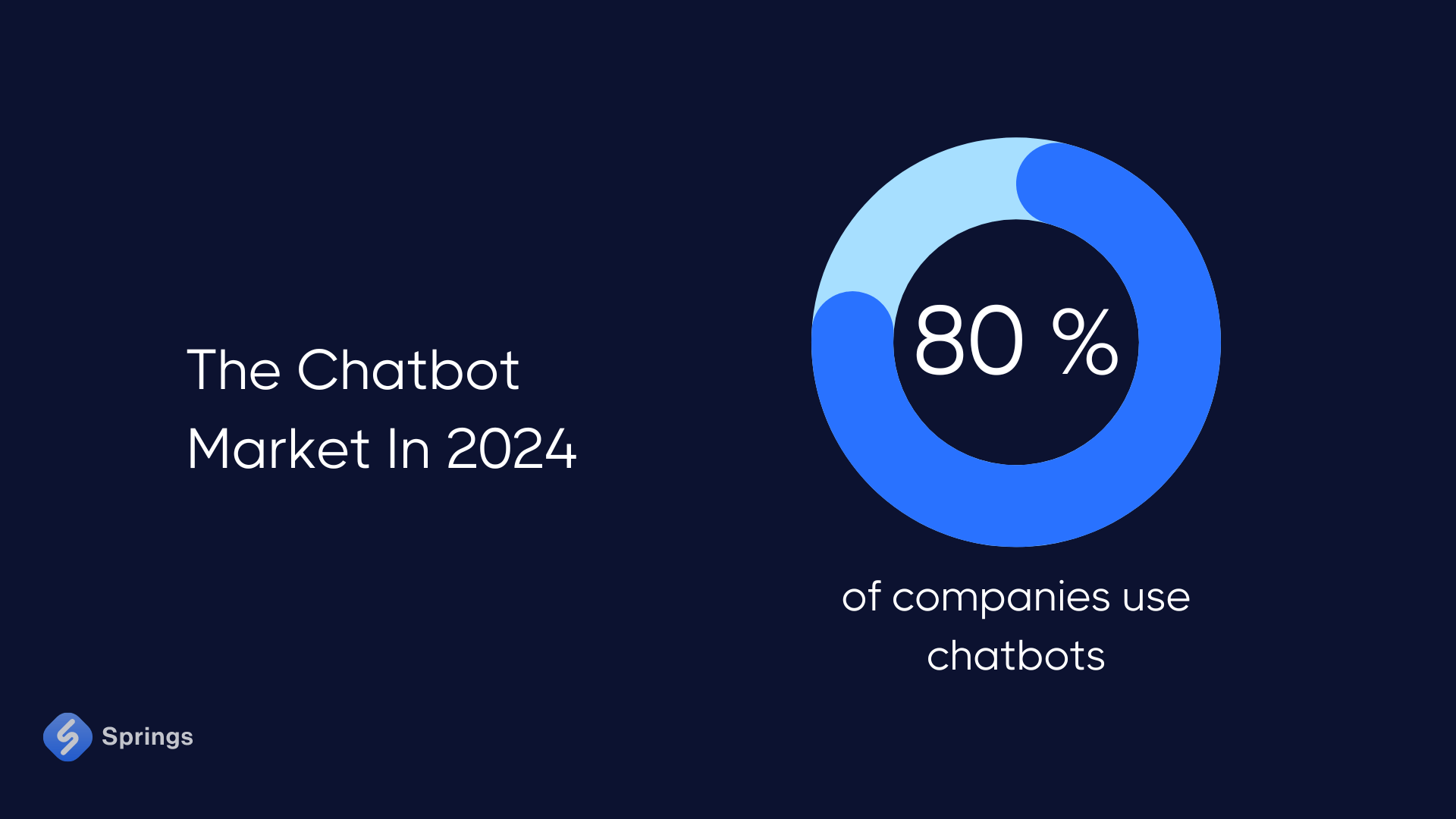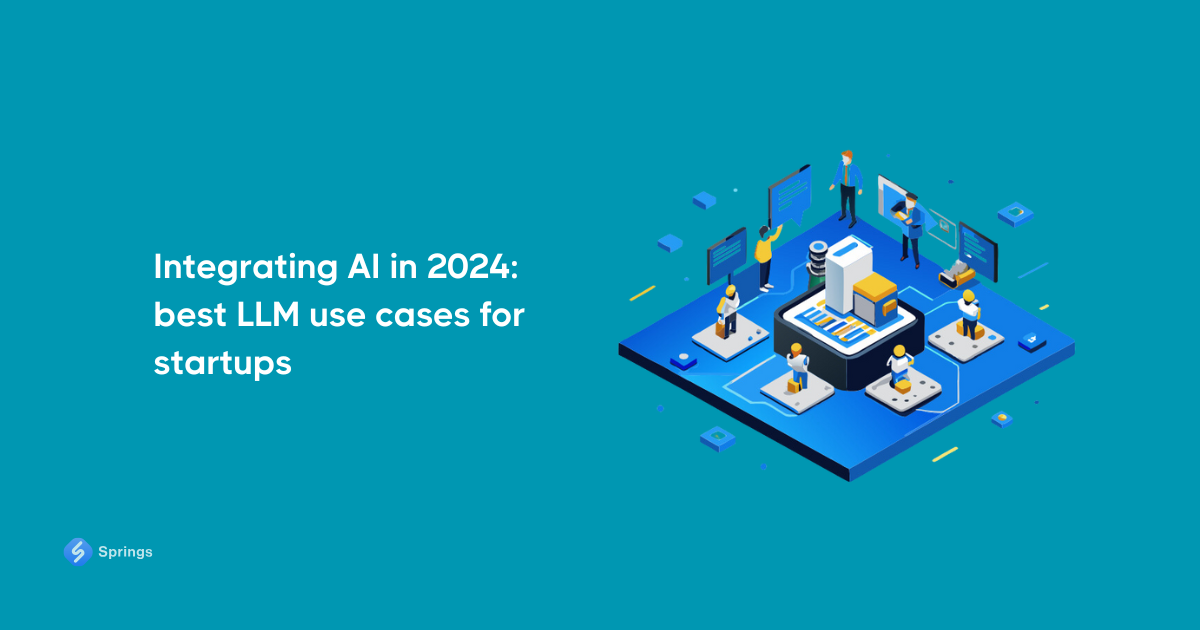The global market of chatbot solutions shows no signs of stopping. In 2023 alone, it rose to an astonishing $5.4 billion. Currently, over 80% of companies around the globe work with some type of these products. The number of chatbots is astronomical, with over 300,000 of them operating on Facebook alone.

The rise of AI opened a new chapter in the history of chatbots. Modern self-learning products gradually replace old rules-based versions. AI enhancement made them irreplaceable for such tasks as customer service and marketing.
A growing demand for advanced chatbots will grow the chatbots market size to $9.4 billion by 2024. But that’s just the tip of the iceberg. Let’s find out why companies are trying to get their hands on these assistants.
Top Chatbot Statistics By Industry
Chatbots have proven themselves as a vital part of the retail sector. In 2023, the majority of companies with chatbot solutions belonged to this industry. Companies working in the healthcare, finance, and travel sectors follow this trend.
The following chatbot statistics show the positive effects of these solutions.
Retail & eCommerce
- 34% approval of chatbots by clients.
- Estimated $142 billion in sales through virtual assistants in 2024.
- 71% of Gen Z customers buy items via chatbots.
- 40% of US consumers use retail digital assistants.
Financial services
- Estimated 110.9 million chatbot users by 2026.
- 70% higher first-call resolution rates.
- 43% of American clients use chatbots for issue resolution.
- Up to 25% increased sales through digital assistants.
Healthcare
- 70% administrative task automation.
- Estimated 75% success rate of assistant solutions.
- 22% of US adults use mental wellbeing bots.
- Estimated $431.47 million healthcare chatbot market growth by 2028.
Travel and Hospitality
- 25% of companies in this sector use chatbots.
- 40% of users find them useful for travel arrangements.
- 37% of clients prefer using intelligent bots to compare reservations.
How Companies Use Chatbots
Chatbots help with employee onboarding, company data management, and client research. But, sales, marketing, and customer support remain primary areas of their use.
Sales
Chatbots are irreplaceable in raising company revenue. They achieve this by improving several critical areas of customer relations.
- Lead generation. Chatbots talk to website visitors, collect customer data, and qualify leads. This helps sales teams identify potential customers.
- Product recommendations. With virtual assistants, clients get personal product suggestions. With this approach, companies will likely sell the right item to the right person.
- Guided buying experience. Advanced chatbots help users shop and answer item-related questions. Having this information on hand allows customers to make more informed buying decisions.
- Automated follow-ups. Modern assistants follow up on the leads. They invite potential customers to explore items based on their activity on the website.
Main Takeaways:
- 80% of businesses show about a 67% increase in sales, with 26% of all transactions coming from chatbots.
- Latest chatbot statistics show that users don’t like searching for products on their own. They prefer shopping with virtual helpers. This leads to 35% faster sales.
- Chatbots result in approximately 28% of website visitors turning into leads.
Marketing
Businesses use chatbots and other AI-based solutions for advertising. They make marketing efforts more targeted and effective, thanks to several benefits.
- Close customer engagement. Chatbots answer client questions, help them shop, resolve issues, and suggest suitable products. All this time, individuals are immersed in the customer experience.
- Personalized content generation. Modern virtual assistants analyze shopping behavior and preferences. They provide tailored marketing content. These include promotions, articles, and videos based on a person’s shopping history.
- Surveys and feedback. Chatbots conduct surveys and gather feedback. This provides insights into the company’s marketing strategies, products, and services.
- Event promotion. These solutions spread the word about upcoming sales, in-store events, and other activities. All thanks to automatic reminders that go to individual clients.
Main Takeaways:
- In some industries, having chatbot solutions increases conversion rates by 70%
- Effective chatbot integration boosts revenue by 7-25%.
- Chatbots segment traffic and use targeted ads to drive 77% of a company’s ROI.
Customer Support
Many companies use modern virtual assistants as around-the-clock customer support agents. Chatbot apps handle themselves great due to several characteristics.
- Instant responses. Virtual assistants answer common customer questions. This cuts down waiting time and helps users get the right information faster.
- Quick issue resolution. These solutions handle common problems and provide detailed instructions about resolving product issues.
- Order tracking. Advanced chatbots provide instant information about orders. They provide customers with timely tracking and delivery data.
- Complaint handling. These solutions track feedback and complaint information. Customer support agents get the most complicated problems that chatbots can’t solve.
Main Takeaways:
- 67% of clients use chatbots for customer support.
- 24% of companies saw an increase in customer support evaluation scores.
- Chatbots handle 64% of routine requests.
Benefits Of Chatbot Integration For Businesses
The adoption of virtual assistants has a positive effect on several business operations:
- 67% increased sales - Chatbots increase sales through proactive cross-selling or upselling. These solutions also decrease cart abandonment and urge clients to buy more later on.
- 70% conversion rates - Virtual assistants are effective in retail and eCommerce. They handle most customer support requests and help clients select the right products.
- 50% better lead generation - Chatbots are invaluable in finding new clients. Over 50% of companies locate high-quality leads via chatbots.
- 64% increased productivity - In 2023 alone, chatbots saved about 2.5 billion hours of work. Automation of customer service, lead generation, and sales contribute to these savings.
- 75%-90% of customer request resolution - This year, chatbots helped resolve 80-90% routine customer questions. In this regard, virtual assistants are more effective than support agents.
- An average of $300,000 yearly savings - Companies that have already adopted AI chatbots saved a sizable amount of funds in 2019. This trend will continue well into 2024.
The Future Hold for The Chatbot Market?
In 2024, the world’s market for chatbots is expected to grow exponentially. The global chatbot market size is expected to reach $15.5 billion in 2028. The United States, Japan, Germany, and Australia will own much of it. At the same time, the number of chatbot users is going to exceed 1.5 billion people. 2024 will be significant due to several factors:
- Rise of voice-enabled chatbots. Technology that’s present in Cortana, Siri, and Alexa will appear in the latest chatbots. This will provide an extra input channel in the traditional text-to-text format.
- Higher use of chatbots for post-sales. In the coming year, chatbots will help businesses contact customers for post-sale interactions.
- More chatbots on SM platforms. Chatbots help deliver a personal user experience. That’s why companies will use them more on social media to build client relations.
- Integration with payment systems. In 2024, Stripe, Razorpay, Paypal, and other payment methods will be compatible with chatbots. It will open new purchase options for users.
Chatbots will play a pivotal role in automating company processes and saving costs and labor. We’re ready to help businesses enhance chatbot tools with the power of artificial intelligence. Let’s go into 2024 together and make it the year of chatbots!





